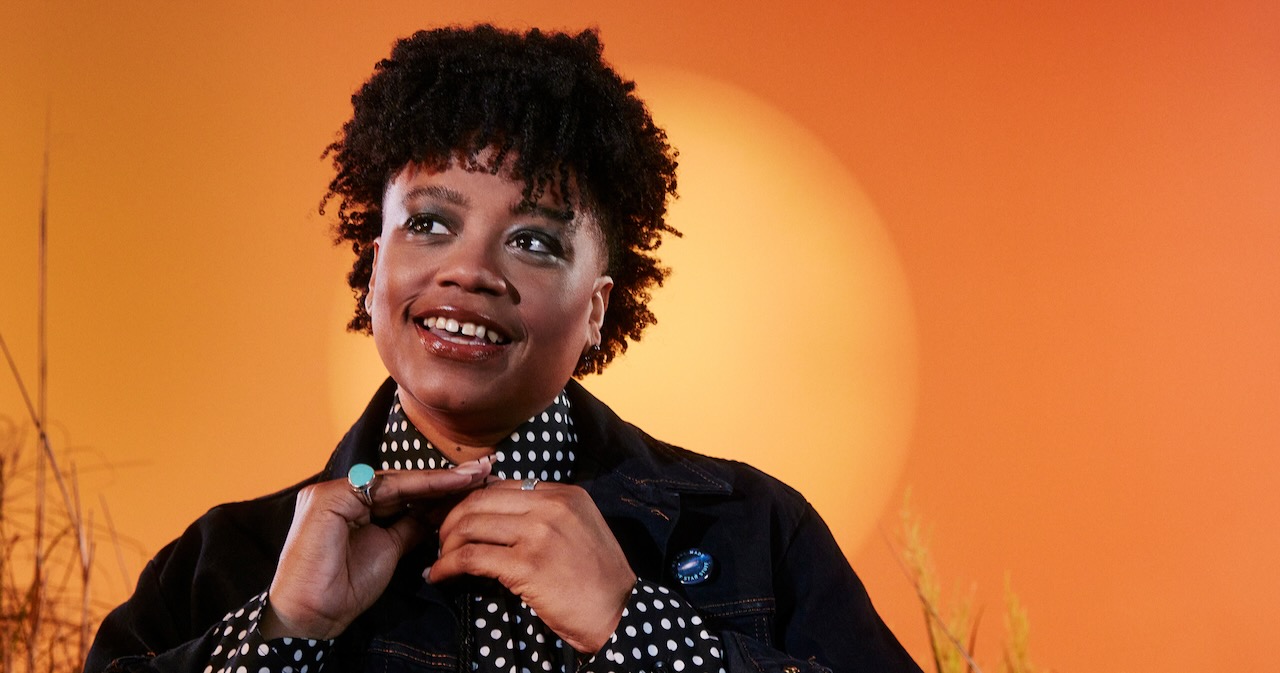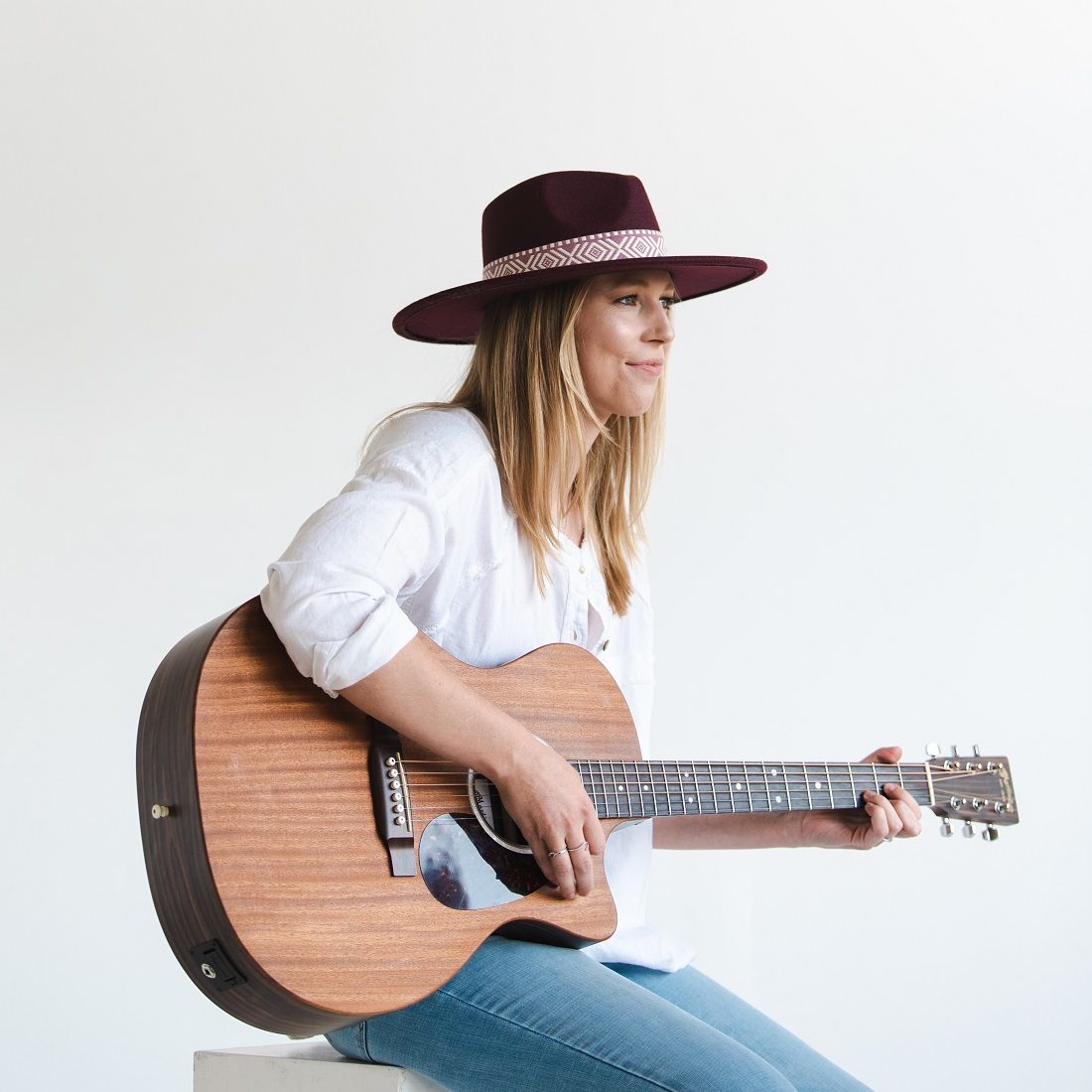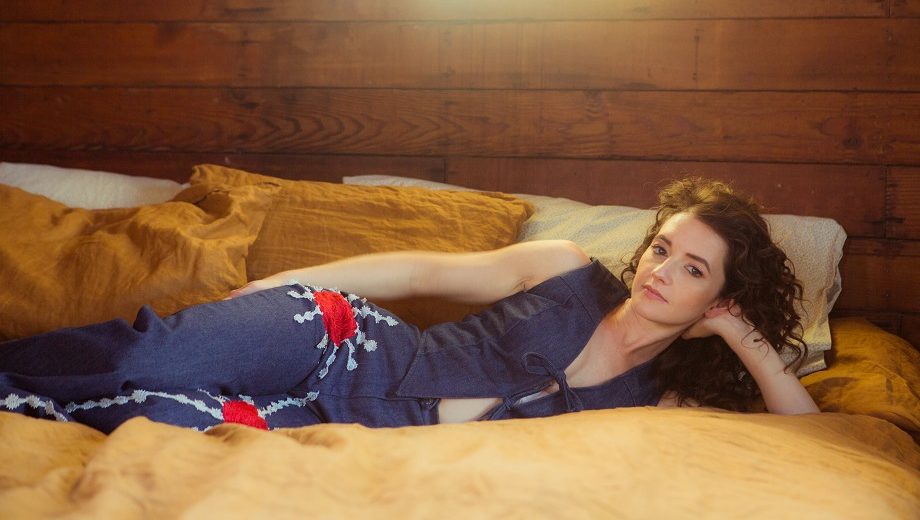Singer-songwriter Amythyst Kiah enjoys ignoring conventional wisdom and challenging notions she considers at best outdated and at worse reactionary and restrictive, regarding what music she should choose or what subjects she should address as an artist. But at the same time, she has never wanted anyone to label or pigeonhole her approach. Since 2010, Kiah has been steadily touring and recording, both solo and with other artists whose music also cuts across multiple thematic and idiomatic boundaries.
Kiah has a prominent, robust voice and is an outstanding guitarist and banjo player. A Chattanooga native and East Tennessee State University graduate, family and community ties are a major part of her life. Kiah’s father used to be her tour manager and she credits his influence (he also was a percussionist in a touring band during the ’70s) as well as that of her late mother (a vocalist in her hometown church choir) in shaping a performance style that is equal parts edgy and disciplined, adventurous but never chaotic or unruly.
After teaching herself to play guitar while attending a creative arts high school, Kiah would subsequently complete the Bluegrass, Old Time, and Country Music Studies program at ETSU and join the school’s marquee old-time band. Her array of activities since 2010 have included releasing the LP Dig In (cut at the ETSU Recording lab in 2013); the five-song EP Chest of Glass (recorded in Johnson City in 2016); and the critically praised Wary + Strange. Wary + Strange was done in Nashville for Rounder and was finally released in 2021 after going through three different producers over a three-year period before finally settling on Tony Berg. It addressed a lot of things in Kiah’s life that were difficult, notably the loss of her mother to suicide.
Conceptually, Kiah’s growth as a vocalist and songwriter is evident from the opening moments of her brand new album, Still + Bright, to its concluding refrain. Whether it’s the extensive lyrical quest for spiritual and personal growth unveiled with vigor in “Play God and Destroy The World,” or the search for peace of mind discussed in “S P A C E,” Kiah’s powerful vocals and insightful lyrics reveal a portrait of an artist willing to acknowledge uncertainty, yet able to find a sense of belonging and salvation through taking the journey.
Musically, the production incorporates a host of sounds, everything from mandolins and fiddles to crisp, crackling guitar lines – plus memorable guest vocals like S.G. Goodman on “Play God” and Kiah’s consistently poignant, stirring lead vocals. The new album, her third solo project, was already generating lavish praise before its release. It will no doubt continue to garner critical support as well as possible mentions on numerous best-of-the-year lists for Americana, folk, and country releases.
Kiah also has her share of high profile covers and collaborations. The most notable among them include being featured vocalist on Moby’s 2021 single “Natural Blues” and doing a cover of Joy Division’s “Love Will Tear Us Apart” in 2022. But perhaps the most celebrated was appearing along with Rhiannon Giddens, Leyla McCalla, and Allison Russell in the supergroup, Our Native Daughters. Sadly, despite being a pioneering all-Black women’s group, Our Native Daughters’ music hasn’t found its way onto the airwaves at urban contemporary radio. But their LP, Songs of Our Native Daughters, was a critical and commercial hit within the Americana and roots music community. Kiah’s composition on the album, “Black Myself,” earned a 2020 GRAMMY nomination for Best American Roots Song.
All this set the stage for Still + Bright. Kiah performed some of its songs during a visit to Nashville for Americanafest 2024; she will be returning to Music City for a highly anticipated appearance on the Grand Ole Opry on December 10. She spoke at length with BGS about her new LP, the recording process, touring, and her love for science fiction, among other things.
Congratulations on the response to Still + Bright.
Amythyst Kiah: Thanks so much. I really wanted to do some different things on this album, show another side in terms of my personality. It was very important for me to say and express certain emotions on Wary + Strange and say some things that needed to be said. I did some of that with Still + Bright, but I also wanted to do some lighter things, some fun things, present other aspects of my life, and reflect more humor, more joy. I’m very happy with how it turned out and the mix of things that we covered and presented.
How was the experience recording in Nashville and how much did having Butch Walker aboard as a producer affect the recording?
Butch was and is so wonderful. Whenever I’d suggest something to him he’d just say, “OK, let’s try it and see what happens.” He was so open to everything and at the same time he knew when to step in and say, “Why don’t you try it this way?” or “Why not add this element to it?” He was so much more like a good friend and buddy than just a hired gun-type producer. When I came to town for this most recent date and asked him about playing, he not only said sure, he showed up and joined right in. It’s been such a treat working with him, a great personal and professional experience.
You describe your sound as “Southern Gothic.” Have you found that the Americana format works for you in terms of getting the necessary promotion and exposure for your music?
It’s really the ideal format, because it does fit so many different styles and types of music. One of the real problems with radio now, especially commercial radio, is that everything is rigidly categorized. If you aren’t doing a very specific thing production-wise, the content and quality don’t matter. With Americana I’ve been welcome to do and try whatever I think fits and whatever I think I want to do musically. I can’t tell you how much creative freedom that gives you as a performer. You’re not writing to fit what someone else thinks might work. You’re free to have your music unfold and develop organically, the way that you hear it.
One thing that really annoys me is that there’s a sizable audience segment out there that very well might relate to your music if they got to hear it, but for a variety of reasons they won’t. Does the restrictiveness of marketing sometimes bother you?
I want to credit the people at Rounder with doing the best job that they can in terms of getting my music out to different and diverse audiences. All I’ll say about that issue is I’ve found that when people get a chance to hear my music and songs, they’ve been universally positive. That’s all that I can do as a performer is present them to the best of my ability. Certainly I’d love to get all types of listeners; I think Rounder works on that as well.
You’ve chosen to remain in Johnson City. How would you describe the music scene there and are there any thoughts about possibly making a move to Nashville?
There’s a lot more of a music scene here than you might think and a lot of that is due to the presence of the university. But there’s an active singer-songwriter scene here. There’s a jazz and blues scene. Certainly it’s not as large as some other places, but it works well for me. I’ve been able to do a lot of playing in clubs when I’m home and also do some songwriting and collaborations with other artists around town. I’m quite satisfied with being here. That doesn’t mean at some time down the line I might not think about coming to Nashville. I really enjoy recording and playing there. Of course from what I hear about the cost of living, that’s a concern. Right now I have no plans to make that move.
One of your non-musical passions is science fiction. Who are some of your favorites?
Interesting that you bring that up. I’m a fan of H.P. Lovecraft from the standpoint of his creativity in depicting horror and fantasy. Now I’ve certainly also become aware of the problematic areas and that gets into the whole discussion of, can you effectively separate the artist and their work from things in their character that are less than desirable, to put it mildly. Clearly, there are things in the Lovecraft legacy that are totally anathema to me, in terms of my identity and all the things I espouse and believe. Do I find some value and get some joy from his writing from a technical perspective? Yes.
Octavia Butler is someone I’m just now beginning to really do a serious examination of and I’m very intrigued and delighted by what I’m seeing so far, especially in regards to how she sees the future and issues of race, class and gender. The Matrix series remains a favorite of mine as well.
You’re about to get back on the road. Does touring still remain something that’s exciting or has the thrill faded with time?
No, as a performer the interaction with the live audience is what drives you and keeps you going. Now I won’t deny that there’s a grind aspect, when you’ve been on the road for several days in a row or for months. But the chance to see new places and play your music for fresh faces and new audiences is an invigorating challenge. It’s really what you get into songwriting and singing to do, much more so than the dollars and cents of it. While no one would deny that you’ve also got to take care of business, it’s the exhilaration of performing that’s the ultimate reason for writing songs and making music. You get a reaction from audiences that you can’t get in the studio.
Photo Credit: Photography by Kevin & King



